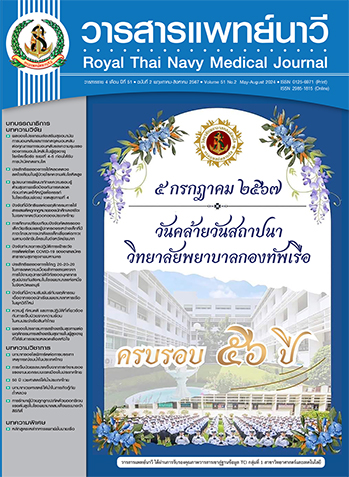The Effects of Health Promotion Program on Health Promoting Behaviors in Older Persons after Percutaneous Coronary Intervention
Main Article Content
Abstract
This quasi-experimental research aimed to study the effect of health promotion program on health promoting behaviors among older persons after percutaneous coronary intervention by applying Pender's health promotion framework. The sample group was elderly people aged 60 years and over, who had coronary artery disease (CAD) after percutaneous coronary intervention (PCI) and stent placement for the first time at Queen Sirikit Heart Center of the Northeast, Faculty of Medicine, Khon Kaen University. Forty-eight samples were selected according to the inclusion criteria. They were equally divided into the experimental group and the control group: 24 people per group. The experimental group received a health promotion program while the control group received regular nursing care for 4 weeks. The data collection tools included a general information interview form, a health behavior assessment form, a health assessment form and a health promoting behavior assessment form. The data were analyzed using descriptive and t-test analysis.
The result revealed that the mean score of health promoting behaviors of the experimental group in the post-experimental period was higher than the pre-experimental period and significantly higher than the control group (p < .05). Therefore, the findings have shown that the health promotion program has an effect on health promoting behaviors in older persons after PCI. Nurses can use this program to care for and promote healthy behaviors in older persons after PCI to reduce the risk of stent restenosis in coronary artery disease patients.
Article Details

This work is licensed under a Creative Commons Attribution-NonCommercial-NoDerivatives 4.0 International License.
References
World Health Organization. WHO reveals leading causes of death and disability worldwide: 2000-2019. [Internet]. [cited 2022 August 29]. Available from: https://www.who.int/news/item/09-12-2020-who-reveals-leading-causes-of-death-and-disability-worldwide-2000-2019.
Strategy and Planning Division, Ministry of Public Health. Mortality rate of patients with coronary heart disease. [Internet]. [cited 2022 August 31]. Available from: http://www.healthkpi.moph.go.th/kpi/kpi-list/view/?id=45. (in Thai).
The Heart Association of Thailand under the Royal Patronage of H.M. Thai chronic coronary syndromes guidelines 2021. Samutprakan: Nextstep D-sign; 2022. (in Thai).
Ministry of Public Health. Health situation analysis: 10 health situations 2010-2019. [Internet]. [cited 2022 August 31]. Available from: https://www.hiso.or.th/thaihealthstat/analysis/report.php?y=25532562. (in Thai).
Hypertension Association of Thailand. Guidelines for treating high blood pressure in general practice 2019. Chiang Mai: Trick Think; 2019. (in Thai).
Bureau of Noncommunicable Diseases, Department of Disease Control, MOPH. Annual report 2018. [Internet]. [cited 2022 August 28]. Available from: http://www.thaincd.com/document/file/download/papermanual/AnnualNCD61.pdf. (in Thai).
Frankel Cardiovascular Center. Coronary artery disease (CAD). [Internet]. [cited 2022 November 13]. Available from: https://www.umcvc.org/conditions-treatments/coronary-artery-disease-cad.
Tsao CW, Aday AW, Almarzooq ZI, Alonso A, Beaton AZ, Bittencourt MS, et al. Heart disease and stroke statistics 2022 update: a report from the American Heart Association. Circulation 2022;145:e153–639.
Bureau of Noncommunicable Diseases, Department of Disease Control, MOPH. Be aware of the dangers of non-communicable diseases: silent danger nearby. 3rd ed. Nonthaburi: Affairs of the Military Welfare Organization; 2016. (in Thai).
Sariso P. Nursing care for the elderly with cardiovascular system. Bangkok: Chulalongkorn University Press; 2022. (in Thai).
Sittisuk S, editor. Medical practice guidelines for patients with ischemic heart disease in Thailand, revised edition. 2nd ed. Bangkok: The Heart Association of Thailand under the Royal Patronage of H.M. 2014. (in Thai).
Cardiovascular Intervention Association of Thailand. Predictors of major adverse cardiovascular events in coronary artery patients undergoing percutaneous coronary intervention (PCI) in Thailand: Thai PCI registry. Nonthaburi: Health Systems Research Institute; 2020. (in Thai).
Nation Heart, Lung, and Blood Institute. Heart treatments: percutaneous coronary intervention. [Internet]. [cited 2022 August 23]. Available from: https://www.nhlbi. nih.gov/health/heart-treatments-procedures.
Abubakar M, Javed I, Rasool HF, Raza S, Basavaraju D, Abdullah RM, et al. Advancements in percutaneous coronary intervention techniques: a comprehensive literature review of mixed studies and practice guidelines. Cureus 2023;15(7):1-9.
Queen Sirikit Heart Center of the Northeast. Annual statistical report on patients receiving treatment at the Queen Sirikit Heart Center of the Northeast. Khon Kaen: Technology and Information Work; 2022. (in Thai).
Siridamrongchai L, Nanthamongkolchai S, Munsawaensub C, Thechaboonsermsak P, YodmaiHealth K. Promotion program to elderly with hypertension by family participation. Journal of Public Health 2018;48(2):161-73. (in Thai).
Thangtumpitak T. Effectiveness of health promotion program for patients with diabetes mellitus at Baan Nongnasang community, Roi Et province. Srinagarind Med J 2019;34(3):243-8. (in Thai).
Sevinc S, Agon G. Application of Pender’s health promotion model to post-myocard infarction patients in Turkey. International Journal of Caring Sciences 2018;11(1):409-18.
Jampathet W, Masingboon K, Ponpinij P, Chantamit-O-Pas C. Factors influencing adherence to cardiac rehabilitation in patients undergoing coronary artery bypass graft surgery. RTN Med J 2022;49(2):275-90. (in Thai).
Francis MP, Gnanadurai A, Resmi P, Benjamin B. Effect of video assisted teaching on knowledge and practice in prevention of recurrence of myocardial infarction among post coronary angioplasty patients. International Journal of Nursing Education 2020;12(1):41-5.
Sukrueangkul A, Vannarit T, Tachaudomdach C. Factors predicting health promoting behaviors among persons with coronary artery disease and undergone percutaneous coronary intervention. Nursing Journal 2019;46(3):118-29. (in Thai).
Chaiwong N, Bonkhonthod P. Predicting factors preventive behaviors for coronary heart disease among persons at risk to disease. Journal of Nursing and Health Care 2019;37(2):6-15. (in Thai).
Suthipong N. Causal relationship model of process of change and health promotion behavior among elderly at risks with ischemic heart disease. [Doctoral Dissertation, Behavior Science Research Institute]. Srinakharinwirot University 2020. (in Thai).
Pender NJ, Murdaugh CL, Parsons MA. Health promotion in nursing practice. 6th ed. Stamford; Appleton; 2011.
Rasrikrid P, Choowattanapakron T. The effect of self-Efficacy promotion combined with family support program on physical activity in older persons with coronary artery disease receiving percutaneous coronary intervention. RTN Med J 2019;46(3):653-68. (in Thai).
Chen H, Hsieh p. Applying the Pender’s health promotion model to identify the factors related to older adults’ participation in community-based health promotion activities. International Int J Environ Res Public Health 2021;18(19):9985.


